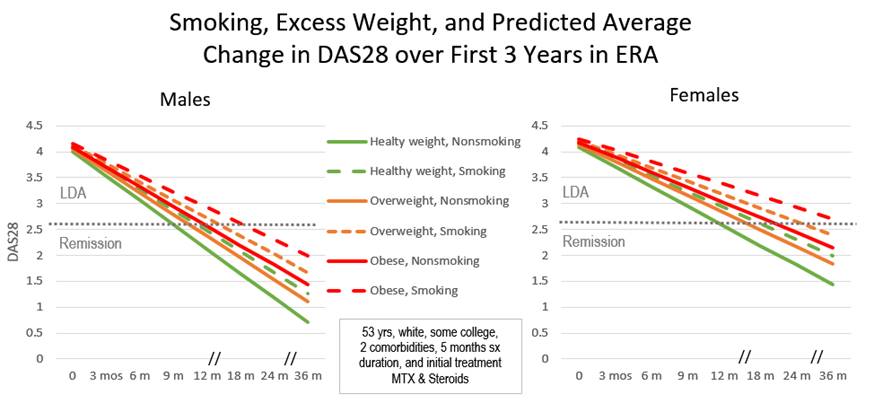Session Information
Date: Tuesday, November 15, 2016
Title: Epidemiology and Public Health II: Obesity, Cancer and Mortality
Session Type: ACR Concurrent Abstract Session
Session Time: 4:30PM-6:00PM
Background/Purpose: Early, aggressive treatment to achieve remission is the primary goal when treating early RA, and is associated with improved long-term outcomes. We have previously shown that individuals who smoke and have excess weight (potentially modifiable factors) are less likely to achieve sustained remission in the first 3 years. Here we explore how smoking, excess weight, and sex affect rate of DAS28 improvement in the first 3 years of early RA.
Methods: Data were drawn from a multicenter prospective cohort study of ERA patients seen in usual care settings. Inclusion criteria were: meeting 1987 or 2010 ACR criteria, <12 months symptom duration at entry, DAS28≥2.6 at entry, and information on BMI and DAS28 at baseline and at least 1 follow up visit. Patients were followed every 3 months in year 1, 6 months in year 2, and annually thereafter. We examined how sex, excess weight (overweight: BMI 25-29.9; obese: BMI 30+) and smoking (current/former/never) impacted DAS28 at baseline and over time using linear growth models. Covariates included baseline age, race, education, comorbidities, symptom duration, and treatment.
Results: The sample included 1109 patients with a mean [SD] age of 54 [15], symptom duration of 6 [3] months; most were female (n=795; 72%) and white (n=893; 81%). Among males 44% (n=138) were overweight, 35% (n=109) were obese and 22% (n=70) smoked; among females, 31% (n=248) were overweight, 32% (n=257) were obese, and 15% (n=121) smoked. At enrollment, most (n=810; 73%) were on MTX. Results of the growth curve model without covariates showed that average DAS28 at baseline was moderate to high (random average DAS28: 4.6, 95% CI: 2.7, 6.2), and DAS28 dropped significantly at each time point (random mean rate of change per visit: b -0.33 (95% CI: -0.60, -0.07). Sex, excess weight, and smoking were not significantly associated with baseline DAS28 (p>0.05). However, each attenuated the rate of DAS28 change over time. The average rate of improvement in DAS28 was lower in women vs men (b: 0.09; 95% CI: 0.05-0.12); those who were overweight (b: 0.05; 95% CI: 0.01-0.09) and obese (b:0.09; 95% CI: 0.05-0.13) vs. healthy weight, and current smokers vs. non-smokers (b:0.07; 95% CI: 0.03-0.12), at each time point. Former smoking did not significantly impact DAS28 trajectory (b:0.03; 95% CI: -0.01-0.06).
Conclusion : Results from a large multi-center ERA cohort study showed that sex, excess weight and smoking significantly attenuated the rates of improvement in RA disease activity over the first 3 years. Improvement among former smokers was similar to those who had never smoked. These results contribute to growing evidence of how lifestyle also may impact treatment outcomes and the potential value of referring patients to proven community-based smoking cessation and weight management programs.
To cite this abstract in AMA style:
Bartlett SJ, Schieir O, Andersen K, Boire G, Haraoui B, Hitchon C, Keystone E, Pope JE, Thorne JC, Tin D, Bykerk VP. Smoking and Excess Weight Attenuate Rate of Improvement over First 3 Years in Early RA [abstract]. Arthritis Rheumatol. 2016; 68 (suppl 10). https://acrabstracts.org/abstract/smoking-and-excess-weight-attenuate-rate-of-improvement-over-first-3-years-in-early-ra/. Accessed .« Back to 2016 ACR/ARHP Annual Meeting
ACR Meeting Abstracts - https://acrabstracts.org/abstract/smoking-and-excess-weight-attenuate-rate-of-improvement-over-first-3-years-in-early-ra/

